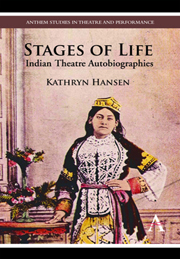Book contents
- Frontmatter
- Contents
- Illustrations
- Preface
- Acknowledgments
- PART 1
- PART 2
- PART 3
- 7 Self and Subjectivity in Autobiographical Criticism
- 8 Voices and Silences: Reading the Texts
- Appendix 1 Historical Personages and Institutions
- Appendix 2 List of Plays and Films
- Glossary: Hindi and Urdu Terms
- Bibliography
- Index
7 - Self and Subjectivity in Autobiographical Criticism
from PART 3
Published online by Cambridge University Press: 05 March 2012
- Frontmatter
- Contents
- Illustrations
- Preface
- Acknowledgments
- PART 1
- PART 2
- PART 3
- 7 Self and Subjectivity in Autobiographical Criticism
- 8 Voices and Silences: Reading the Texts
- Appendix 1 Historical Personages and Institutions
- Appendix 2 List of Plays and Films
- Glossary: Hindi and Urdu Terms
- Bibliography
- Index
Summary
The autobiographical writing of actors and playwrights constitutes a unique resource for the study of theatre and cultural history. As seen in Chapter 2, theatrical memoirs are invaluable historical documents fortuitously preserved in published form. But they are also the life-stories of distinct individuals. Their narrators tell of childhood, of growing up, of entering the wider world and struggling for success. Through these compelling narratives of personhood, the reader glimpses the interplay of memory and experience. The felt quality of the actor's life, his constructions of self and others, his modes of performing his identity are on display. These autobiographies present the reader with a medium through which to explore the subjectivity of the theatrical personality, alternately masked and unmasked in its many guises.
It has often been noted that first-person accounts make strong claims to veracity. The autobiographer's version of the past is valorized as being more authentic, offering a closer vantage point than other kinds of writing. Yet autobiographies like other textual artifacts are fabricated, composed by design. They are crafted under specific conditions for specific audiences, by authors with their own agendas. Like all stories, these narratives involve selection and edition. They are situated within particular times, places, and social systems, and can never be free of mediation. Indeed, the process of representing one's own life is highly charged, and the narrator may resort to hyperbole and polemic as much as to balanced remembering and recording.
- Type
- Chapter
- Information
- Stages of LifeIndian Theatre Autobiographies, pp. 299 - 314Publisher: Anthem PressPrint publication year: 2011



